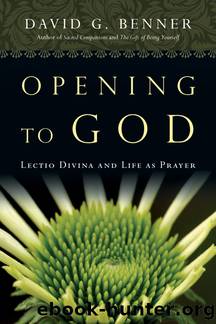Opening to God: Lectio Divina and Life as Prayer by David G. Benner

Author:David G. Benner [Benner, David G.]
Language: eng
Format: epub
Publisher: InterVarsity Press
Published: 2010-08-02T22:00:00+00:00
CULTIVATING PRAYERFUL PONDERING
Pondering prayer is responding to the invitation to bring your mind, heart and imagination to your communion with God. Let me suggest several practical things you can do if you wish to further cultivate this sort of prayer.
1. Begin by including a brief time of sharing the things you have been thinking about in any time of worded prayer. Talk with God about the things that have been heavy on your heart or mind. Even simply naming them is prayer. For example, you might say: “Lord, you know I have been thinking a lot these days about my finances. I offer you that thinking.” Or “Lord, I am concerned about my mother’s health and unsure whether to advise her to undergo further chemotherapy. I offer you my thinking and concerns.” As you prepare yourself for prayer by gathering yourself in stillness, simply make your first words a naming of your present realities—including the things you have been pondering in heart and mind. For most of us it takes no special effort to remember to make time to ponder things. We do so naturally much of our waking hours, and this pondering then carries over into our sleep, often translating itself into the content of our dreams. What we need to remember is to share these ponderings with God. This invites God to be a part of our inner life and gives God access to our depths.
2. Ponder the meaning and significance of some of the major Christian rituals and practices that are part of your life. Think through, for example, what prayer means to you—not just how you understand it or what it should mean, but its actual significance to you. Ponder the meaning and personal significance of Communion (or the Eucharist) the next time you receive it. Listen carefully to the words that are spoken in the preparation for this moment and in the distribution of the elements. Ponder them during and after the experience. Do the same with other regular elements of your own church tradition. Next time you witness a baptism, think again of the significance of your own baptism and of the baptismal vows taken by you or offered on your behalf by others. Take some of these familiar elements of religious practice and open them up for deeper personal meaning as you engage with them in pondering prayer.
3. The next time you find yourself reflecting on some recent personal experience, take a moment to invite God to be part of this process. Remember, bidden or not, God is already present. And anything that is on your heart and in your mind is an issue of importance to God. Start by focusing on the experience. This grounds the reflection and makes it quite different from abstract speculation. After reviewing the experience for a few moments, step back from the details of what happened and view the whole situation through the lens of your faith and your faith tradition. What images form in your mind
Download
This site does not store any files on its server. We only index and link to content provided by other sites. Please contact the content providers to delete copyright contents if any and email us, we'll remove relevant links or contents immediately.
The 5 Love Languages: The Secret to Love That Lasts by Gary Chapman(8524)
The Space Between by Michelle L. Teichman(6095)
Assassin’s Fate by Robin Hobb(5251)
Wiseguy by Nicholas Pileggi(4600)
Everything Happens for a Reason by Kate Bowler(4074)
Gerald's Game by Stephen King(3925)
A Simplified Life by Emily Ley(3579)
The Power of Positive Thinking by Norman Vincent Peale(3460)
Pillow Thoughts by Courtney Peppernell(3412)
Resisting Happiness by Matthew Kelly(2891)
Girl, Wash Your Face by Rachel Hollis(2828)
Being Aware of Being Aware by Rupert Spira(2711)
Name Book, The: Over 10,000 Names--Their Meanings, Origins, and Spiritual Significance by Astoria Dorothy(2495)
Real Sex by Lauren F. Winner(2480)
More Language of Letting Go: 366 New Daily Meditations by Melody Beattie(2455)
The Holy Spirit by Billy Graham(2425)
Fast Facts on Defending Your Faith by John Ankerberg & John Weldon(2394)
Victory over the Darkness by Neil T. Anderson(2388)
The Secret Power of Speaking God's Word by Joyce Meyer(2257)
